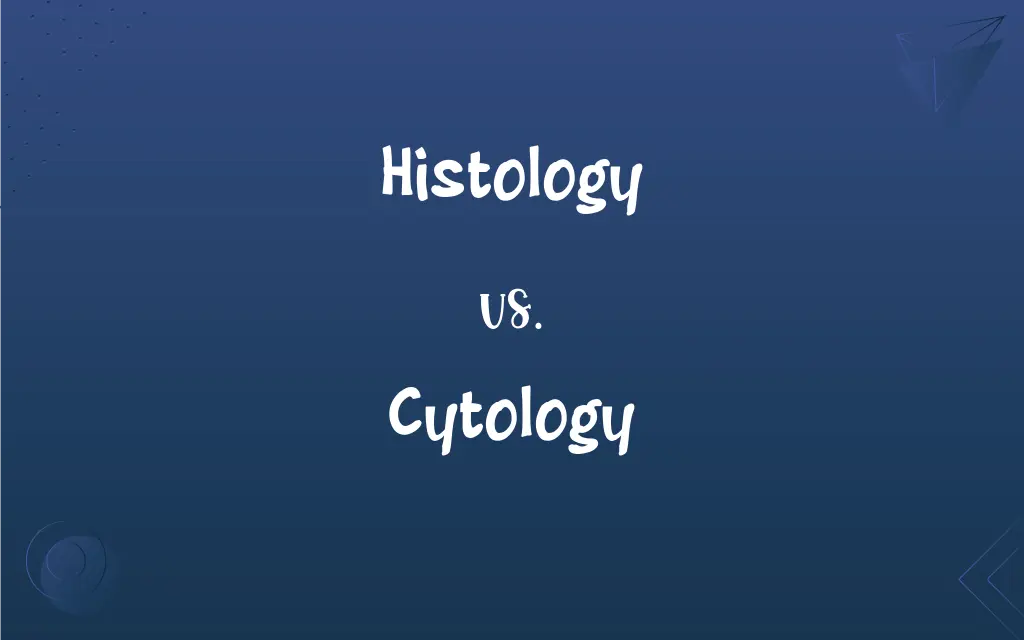Histology vs. Cytology: What's the Difference?
Edited by Aimie Carlson || By Janet White || Updated on October 3, 2023
Histology is the branch of biology which studies plant and animal tissues while, cytology is also the branch of biology which studies cells.

Key Differences
Histology pertains to the study of the microscopic anatomy of tissues, diving into the organization and structure of groups of specialized cells and their products. Cytology, on the other hand, focuses on the examination of individual cells to detect cellular abnormalities and study cellular structures.
In histology, the samples are often obtained from biopsies or surgical procedures where a broad tissue structure is available for analysis. Cytology, meanwhile, typically relies on samples like swabs, scrapings, or body fluids, concentrating more on the evaluation of single cells.
Histology provides insight into the architecture, function, and pathology of tissues, allowing professionals to observe how cells work together within their environment. Cytology, conversely, offers a closer look into the cellular level, highlighting aspects such as the cell's morphology, physiology, and biochemistry.
A crucial tool in histology is the microscope, which helps differentiate various tissues based on their structure and staining properties. Cytology, while also dependent on microscopes, primarily uses cytopathology to study cell formation, function, and abnormalities.
Medical professionals use histology to diagnose diseases related to tissue disorders and changes, while cytology is more frequently used in early detection of cancer, especially in screenings like the Pap smear.
ADVERTISEMENT
Comparison Chart
Focus
Studies tissues.
Studies individual cells.
Sample Source
Biopsies, surgical procedures.
Swabs, scrapings, body fluids.
Application
Tissue disorders and changes.
Early detection of cancer.
Microscopic Use
Tissue structure and staining.
Cell formation, function, abnormalities.
Study Level
Microscopic anatomy of tissues.
Cellular structures and physiology.
ADVERTISEMENT
Histology and Cytology Definitions
Histology
Examination of the organization of cells in tissues.
Histology reveals the complex interactions between different cell types.
Cytology
Analysis of cells from body fluids, scrapings, or swabs.
The doctor ordered cytology on the pleural fluid to check for malignancy.
Histology
Analysis of tissue samples under a microscope.
The biopsy was sent for histology to determine if the tumor was malignant.
Cytology
The study of cell structure and function.
Cytology provides insights into the cellular mechanisms of disease.
Histology
Investigation of the composition and function of bodily tissues.
Through histology, researchers can gain insights into diseases affecting specific tissues.
Cytology
Examination of individual cells to detect abnormalities.
A routine Pap smear is a cytology test used for early detection of cervical cancer.
Histology
Study of the microscopic structure of tissues.
Histology is crucial for understanding the intricate details of organ systems.
Cytology
Investigation of cellular morphology and physiology.
Cytology helps in understanding the behavior of cells during various stages of growth.
Histology
The study of the microscopic anatomy of tissues.
The medical student studied the histology slides to understand the tissue structures.
Cytology
Study of cell formation, function, and biochemistry.
Cytology forms the foundation of cellular biology, bridging understanding between individual cells and tissues.
Histology
The anatomical study of the microscopic structure of animal and plant tissues.
Cytology
The branch of biology that deals with the formation, structure, and function of cells.
Histology
The microscopic structure of tissue.
Cytology
(biology) The study of cells.
Histology
(biology) The study of the microscopic structure, chemical composition and function of the tissue or tissue systems of plants and animals.
Cytology
Cytopathology.
Histology
That branch of biological science, which treats of the minute (microscopic) structure of animal and vegetable tissues; - called also histiology.
Cytology
The branch of biology that studies the structure and function of cells
Histology
The branch of biology that studies the microscopic structure of animal or plant tissues
FAQs
In what medical test is cytology prominently used?
Cytology is prominently used in the Pap smear test for early detection of cervical cancer.
How are samples obtained for histology?
Samples for histology are usually obtained from biopsies or surgical procedures.
How do cytologists differentiate between normal and abnormal cells?
Cytologists observe cell morphology, size, shape, and organization to distinguish between normal and abnormal cells.
How does histology benefit medical diagnosis?
Histology helps diagnose diseases related to tissue disorders and changes.
Why are staining techniques important in histology?
Staining techniques in histology help differentiate various tissues based on their structure and properties.
Why is histology considered a fundamental biological science?
Histology provides insights into tissue organization, aiding understanding of organ function and pathology.
How often should routine cytological tests be done?
The frequency depends on the specific test and individual risk factors, but some, like the Pap smear, are recommended annually or biennially.
Can histology provide information on disease progression?
Yes, histology can reveal stages of diseases and the extent of tissue involvement or damage.
Is cytology limited only to human cells?
No, cytology studies cells from all organisms, not just humans.
How vital is histology in drug development?
Histology aids understanding of drug effects on tissues, crucial for safety and efficacy evaluations in drug development.
What is the primary tool used in cytology?
The primary tool for cytology is the microscope, focusing on cell formation, function, and abnormalities.
How accurate is cytology in diagnosing diseases?
While cytology is valuable, it may sometimes require complementary tests for a definitive diagnosis.
What do histology slides typically display?
Histology slides display thin sections of tissues, stained to highlight various structures.
Are histology and cytology interrelated?
Yes, both study the microscopic aspects of the body, with histology focusing on tissues and cytology on cells.
What does histology study?
Histology studies the microscopic anatomy of tissues.
What is the main focus of cytology?
Cytology focuses on studying individual cells and their functions.
How does histology differ from gross anatomy?
While gross anatomy studies structures visible to the naked eye, histology delves into the microscopic anatomy of tissues.
What’s the relevance of cytology in modern medicine?
Cytology plays a pivotal role in disease diagnosis, particularly in detecting cellular abnormalities.
Can histology determine tissue function?
While histology primarily studies tissue structure, it can offer insights into potential tissue functions.
Can cytology detect cancer?
Yes, cytology is often used in the early detection of cancer, particularly at the cellular level.
About Author
Written by
Janet WhiteJanet White has been an esteemed writer and blogger for Difference Wiki. Holding a Master's degree in Science and Medical Journalism from the prestigious Boston University, she has consistently demonstrated her expertise and passion for her field. When she's not immersed in her work, Janet relishes her time exercising, delving into a good book, and cherishing moments with friends and family.
Edited by
Aimie CarlsonAimie Carlson, holding a master's degree in English literature, is a fervent English language enthusiast. She lends her writing talents to Difference Wiki, a prominent website that specializes in comparisons, offering readers insightful analyses that both captivate and inform.
































































